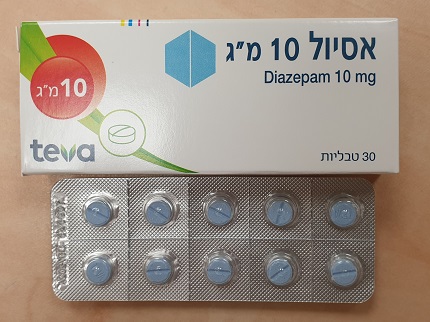Quest for the right Drug

אסיול 10 מ"ג ASSIVAL 10 MG (DIAZEPAM)
תרופה במרשם
תרופה בסל
נרקוטיקה
ציטוטוקסיקה
צורת מתן:
פומי : PER OS
צורת מינון:
טבליה : TABLETS
עלון לרופא
מינוניםPosology התוויות
Indications תופעות לוואי
Adverse reactions התוויות נגד
Contraindications אינטראקציות
Interactions מינון יתר
Overdose הריון/הנקה
Pregnancy & Lactation אוכלוסיות מיוחדות
Special populations תכונות פרמקולוגיות
Pharmacological properties מידע רוקחי
Pharmaceutical particulars אזהרת שימוש
Special Warning עלון לרופא
Physicians Leaflet
Interactions : אינטראקציות
4.5. Interaction with other medicinal products and other forms of interaction Not recommended Alcohol Concomitant use with alcohol is not recommended due to enhancement of the sedative effect. This affects the ability to drive and use machinery). Sodium oxybate Avoid concomitant use (enhanced effects of sodium oxybate). HIV-protease inhibitors Avoid concomitant use (increased risk of prolonged sedation) - see below for zidovudine. Opioids: The concomitant use of sedative medicines such as benzodiazepines or related drugs such as Assival with opioids increases the risk of sedation, respiratory depression, coma and death because of additive. CNS depressant effects. The dosage and duration of concomitant use should be limited (see section 4.4). Take into account Centrally acting drugs enhancement of the central depressive effect or sedative effects of diazepam are likely to be intensified by concomitant administration with centrally, acting drugs such as neuroleptics, antipsychotics, anxiolytics/sedatives, , tranquillisers antidepressants, , hypnotics, anti-convulsants, analgesics, narcotic analgesics anaesthetics, barbiturates and sedative antihistamines. The elderly may require special supervision. Narcotic analgesics In the case of narcotic analgesics , enhancement of euphoria may also occur leading to an increase in psychic dependence. The elderly require supervision Anti-epileptic drugs Pharmacokinetic studies on potential interactions between diazepam and antiepileptic drugs have produced conflicting results. Both depression and elevation of drug levels, as well as no change, have been reported. Phenobarbital taken concomitantly may result in an additive CNS effect. Special care should be taken in adjusting the dose in the initial stages of treatment. Side effects may be more evident with hydantoins or barbiturates. Diazepam has been reported to be displaced from protein-binding sites by sodium valproate (increased serum levels: increased risk of drowsiness). There have also been reports that the metabolic elimination of phenytoin is affected by diazepam. Other drugs enhancing the sedative effect of diazepam Cisapride, lofexidine, nabilone, disulfiram and the muscle-relaxants - baclofenand tizanidine. Cisparide may lead to a temporary increase in the sedative effects of orally administered benzodiazepines due to faster absorption. Compounds that affect hepatic enzymes (particularly cytochrome P450): Known inhibitors of hepatic enzymes: e.g cimetidine; isoniazid; erythromycin; omeprazole; esomeprazole fluvoxamine and fluoxetine have been shown to reduce the clearance of benzodiazepines and may potentiate their action. Itraconazloe, ketoconazole, and to a lesser extent fluconazole and voriconazole are potent inhibitors of the cytochrome P450 isoenzyme CYP3A4 and may increase plasma levels of benzodiapine. The effects of benzodiapine may be increased and prolonged by concomitant use. A dose reduction of the benzodiazepine may be required. known inducers of hepatic enzymes e.g. rifampicin) may increases the clearance of benzodiazepines. Antihypertensives, vasodilators& diuretics: Enhanced hypotensive effect with ACE inhibitors, alpha-blockers, angiotensin-II receptor antagonists, calcium channel. blockers adrenergic neurone blockers, beta-blockers, moxonidine, nitrates, hydralazine, minoxidil, sodium nitroprusside and diuretics. Enhanced sedative effect with alpha-blockers or moxonidine. Dopaminergics Possible antagonism of the effect of levodopa. Antacids Concurrent use may delay absorption of diazepam. Zidovudine Increased zidovudine clearance by diazepam. Oestrogen-containing contraceptives Possible inhibition of hepatic metabolism of diazepam. Theophylline Increases metabolism of diazepam which possibly reduces the effect. Caffeine Concurrent use may result in reduced sedative and anxiolytic effects of diazepam. Grapefruit juice Inhibition of CYP3A4 may increase the plasma concentration of diazepam (possible increased sedation and amnesia). This interaction may be of little significance in healthy individuals, but it not clear is if other factors such as old age or liver cirrhosis increase the risk of adverse effects with concurrent use.

שימוש לפי פנקס קופ''ח כללית 1994
Anxiety & tension, neurotic states, skeletal muscle spasm
תאריך הכללה מקורי בסל
01/01/1995
הגבלות
תרופה שאושרה לשימוש כללי בקופ'ח
מידע נוסף
עלון מידע לצרכן
19.07.21 - עלון לצרכן אנגלית 19.07.21 - עלון לצרכן עברית 19.07.21 - עלון לצרכן ערבית 08.06.23 - עלון לצרכן עברית 27.10.23 - עלון לצרכן אנגלית 27.10.23 - עלון לצרכן עברית 27.10.23 - עלון לצרכן ערבית 07.01.21 - החמרה לעלון 07.01.21 - החמרה לעלון 11.01.21 - החמרה לעלון 19.07.21 - החמרה לעלון 08.06.23 - החמרה לעלוןלתרופה במאגר משרד הבריאות
אסיול 10 מ"ג